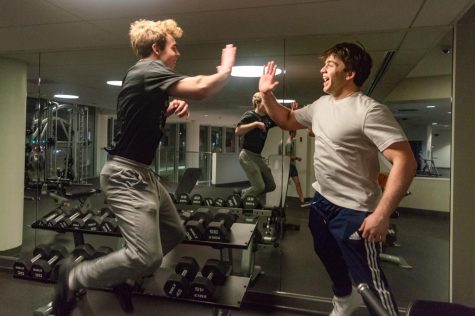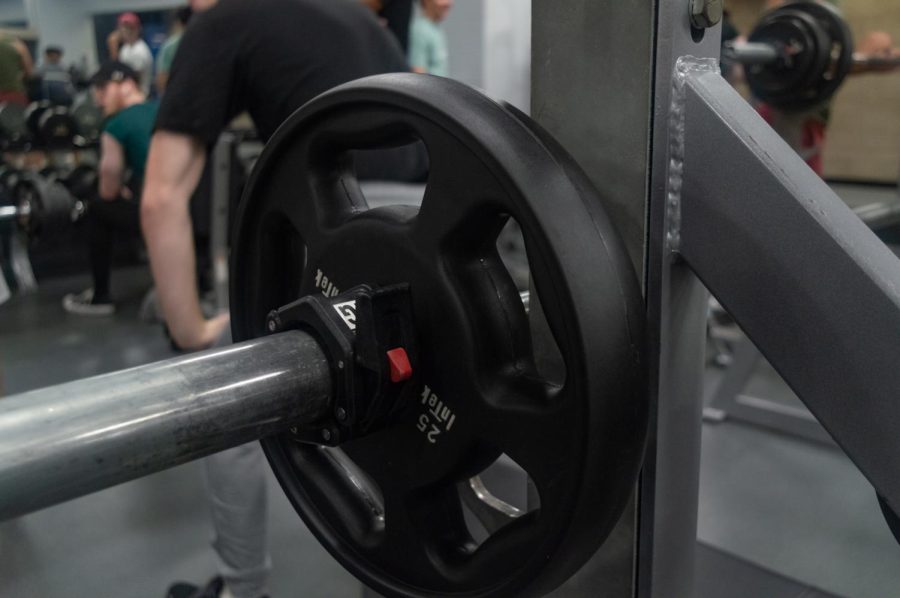Op-ed: Could weightlifting benefit student wellbeing?
A 25-pound weight plate rests on a bench press in Marino Recreational Center. Alexis Algazy has discovered the mental benefits of weightlifting have become more important to her than the physical results.
February 25, 2023
Not every gym rat is lifting weights for a chiseled physique. Weight training can be the perfect addition to a student’s routine for mental health and memory benefits.
For years, I did hours upon hours of cardio, under the impression that burning calories on runs and bike rides would help me achieve my fitness goals. At the time, my wellness teacher in high school emphasized that losing weight was solely dependent on burning more calories than you consume, but now I have learned that weighing less is not conducive to being healthy and happy. I first got into weight training about a year ago, and I approached it with the attitude and goals that many do: to get more fit and improve my body. Fast forward a year later and I’ve found that the benefits of weight training go far deeper than physical looks. Rather, I’ve noticed a significant difference in my mental health and concentration since the beginning of my fitness journey.
40 million American adults ages 18 and older are affected by some sort of anxiety disorder, as reported by The Anxiety & Depression Association of America, and those without anxiety disorders are not excluded from feeling angst and heightened nerves in their daily lives. The stressors that come with rigorous academics, living without the constant support of parental figures, navigating the social scene that college offers and getting involved on campus are familiar to all students. Weight training might be a solution to decrease these anxieties.
Weightlifting and resistance training have been found to significantly reduce anxiety and improve mental health. You don’t need to be an avid lifter with a passion for the sport, rather, a greater decrease in anxiety was induced through low-to-moderate intensity weight training than in higher intensity workouts, as cited in a 12-week study in Frontiers in Psychology. This means if you’re seeking to reduce feelings of anxiety rather than grow bulging biceps, low-to-moderate weight training, meaning lower weights at higher repetition, will be effective for your goals.
According to the Mayo Clinic, prolonged anxiety can endanger the body as the effects of high cortisol levels, or the stress hormone, can result in undesirable physical effects such as interrupted sleep patterns, weight gain, concentration problems and more. Sleep and concentration are vital for a student’s ability to function and thrive. It is of the utmost importance to seek ways to lower one’s anxieties in an environment with constant stressors.

Through my experience, I have found that a morning workout helps me start my day with a clear head. The reeling nervous thoughts that sometimes plague my head for the entire day seem to fade after a morning weight training session. This clear mind helps me focus in class and be more productive while studying.
Similar to many of my peers, anxiety has been a part of my life for quite some time, but weight training has been an escape of sorts. Once I realized that weight training was impacting more than just my physical health, it increased my persistence because I found that spending just an hour of my day in the gym benefitted my overall well-being.
Not only can weight lifting decrease anxiety levels, but exercise itself can actually aid memory, a necessary skill to build for when exam season rolls around. A 2019 study conducted by Paul D. Loprinzi P.D. and colleagues concluded that performing acute exercise prior to a memory activity can enhance one’s recall ability. Weightlifting can act as an acute exercise if done in shorter spans of time rather than spending long at the gym.
While I cannot say I have developed an exceptional memory since beginning my time in the gym, I do feel it has increased my daily attention, which allows me to focus more intently on studying post-workout.
If both of these studies are taken into account, a moderate level weightlifting session may simultaneously decrease anxiety and increase memory recall, seemingly the perfect balance for college students.
The gym can be intimidating for newbies, but once you develop a routine it becomes a comforting part of your day. For those who cannot fathom walking into the overpacked Marino Recreation Center on campus, there are ways to weight train in the privacy of your dorm; with just a pair of dumbbells, resistance bands and a kettlebell, you can develop a simple routine without leaving the safety of your room. Whether you make it to the gym to weight lift, or you bring the gym to your dorm, taking a chance on the gym rats could be just what your cortisol levels and study skills need.
Alexis Algazy is a first-year journalism and political science combined major. She can be reached at algazy.a@northeastern.edu.







